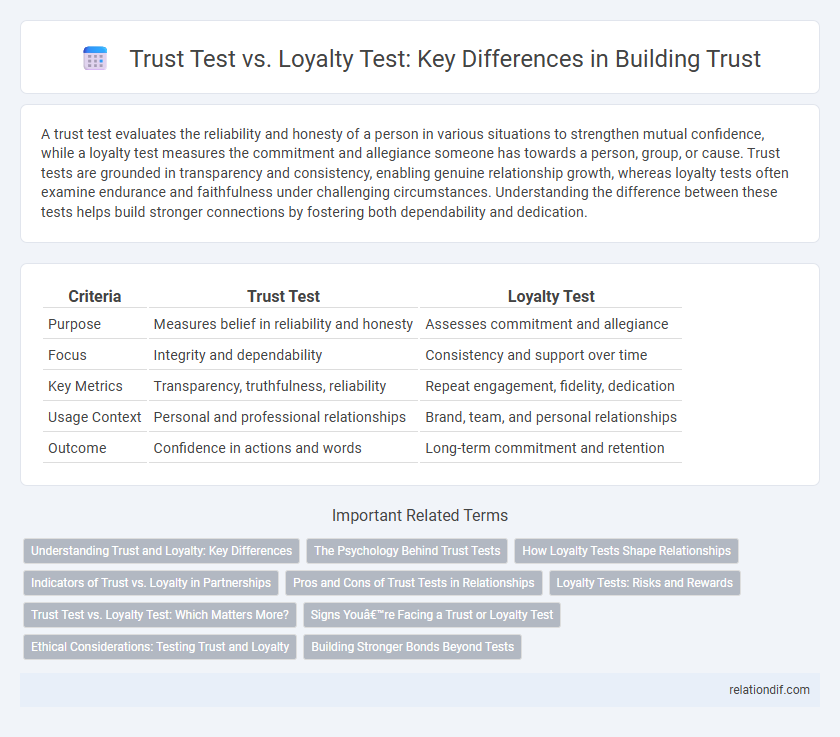A trust test evaluates the reliability and honesty of a person in various situations to strengthen mutual confidence, while a loyalty test measures the commitment and allegiance someone has towards a person, group, or cause. Trust tests are grounded in transparency and consistency, enabling genuine relationship growth, whereas loyalty tests often examine endurance and faithfulness under challenging circumstances. Understanding the difference between these tests helps build stronger connections by fostering both dependability and dedication.
Table of Comparison
| Criteria | Trust Test | Loyalty Test |
|---|---|---|
| Purpose | Measures belief in reliability and honesty | Assesses commitment and allegiance |
| Focus | Integrity and dependability | Consistency and support over time |
| Key Metrics | Transparency, truthfulness, reliability | Repeat engagement, fidelity, dedication |
| Usage Context | Personal and professional relationships | Brand, team, and personal relationships |
| Outcome | Confidence in actions and words | Long-term commitment and retention |
Understanding Trust and Loyalty: Key Differences
Trust tests evaluate an individual's reliability and integrity by observing consistent honesty and transparency in actions, while loyalty tests measure allegiance and commitment to a person or cause, often through scenarios involving difficult choices. Understanding that trust is foundational for any relationship highlights its role as a predictor of future behavior, whereas loyalty reflects sustained support despite challenges. Differentiating these concepts aids in accurately assessing interpersonal dynamics and strengthening bonds effectively.
The Psychology Behind Trust Tests
Trust tests reveal underlying psychological mechanisms by assessing an individual's willingness to be vulnerable and predict others' reliability, whereas loyalty tests often measure commitment linked to emotional bonds. Neuroscientific studies show that trust activates brain regions associated with reward and social cognition, emphasizing the importance of perceived integrity and consistency. Understanding these psychological foundations helps differentiate genuine trust from mere loyalty, highlighting trust tests as tools for evaluating cognitive and emotional trustworthiness.
How Loyalty Tests Shape Relationships
Loyalty tests serve as pivotal moments that reveal the strength and depth of trust within a relationship by assessing consistent support and commitment over time. Unlike trust tests that gauge immediate reliability, loyalty tests emphasize long-term allegiance and resilience under pressure, shaping the dynamic and emotional bonds between individuals. This continuous evaluation fosters stronger connections by affirming mutual dedication and reinforcing the foundation of trust essential for enduring relationships.
Indicators of Trust vs. Loyalty in Partnerships
Indicators of trust in partnerships include consistent transparency, open communication, and reliability in fulfilling commitments, reflecting a foundation of mutual confidence. Loyalty tests often reveal emotional attachment and allegiance even when faced with challenges, but these do not necessarily guarantee trustworthiness. High trust is demonstrated through actions that build credibility and accountability, whereas loyalty centers on sustained support regardless of circumstances.
Pros and Cons of Trust Tests in Relationships
Trust tests in relationships can reveal hidden doubts and assess a partner's honesty, promoting transparency and addressing underlying insecurities. However, these tests often risk damaging communication and breeding suspicion, as partners may feel manipulated or mistrusted, ultimately eroding emotional intimacy. Effectively balancing openness with respect for autonomy is crucial to maintaining a healthy partnership without relying on trust tests.
Loyalty Tests: Risks and Rewards
Loyalty tests examine an individual's commitment but carry significant risks, including damaging relationships through perceived manipulation and fostering distrust. When conducted thoughtfully, these tests can reveal genuine allegiance and strengthen bonds by clarifying expectations. Balancing transparency and intention is crucial to ensuring loyalty tests result in meaningful trust rather than undermining it.
Trust Test vs. Loyalty Test: Which Matters More?
Trust tests evaluate reliability and honesty in relationships by assessing consistent behavior over time, while loyalty tests measure allegiance and commitment often through challenges or difficult situations. Trust forms the foundation for loyalty, making it a more crucial element in building lasting connections and meaningful partnerships. Prioritizing trust tests provides deeper insights into character integrity, which ultimately strengthens genuine loyalty.
Signs You’re Facing a Trust or Loyalty Test
Signs you're facing a trust test include frequent questioning of your intentions, withholding of information, or sudden changes in communication patterns. Loyalty tests often involve subtle attempts to gauge your allegiance, such as being put in situations where you must choose between conflicting interests or revealing confidential information. Recognizing these behaviors helps distinguish between challenges to trust, based on reliability and honesty, and loyalty tests, which assess commitment and faithfulness.
Ethical Considerations: Testing Trust and Loyalty
Ethical considerations in trust tests emphasize transparency, consent, and the potential psychological impact on individuals, ensuring that testing methods respect personal boundaries and foster genuine relationships. Loyalty tests often risk breaching privacy and manipulating emotions, raising significant ethical concerns about deception and long-term harm to trust. Prioritizing open communication and mutual agreement in both trust and loyalty assessments promotes integrity and protects emotional well-being.
Building Stronger Bonds Beyond Tests
Trust tests often evaluate immediate reactions, while loyalty tests measure long-term commitment, both playing distinct roles in relationships. Building stronger bonds requires consistent honesty, open communication, and mutual respect that transcend temporary assessments. Fostering genuine connections encourages resilience and deepens trust beyond the limitations of any single test.
Trust test vs loyalty test Infographic

 relationdif.com
relationdif.com